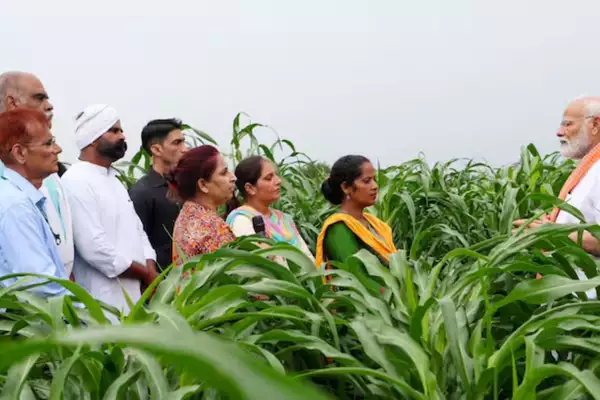Prime Minister released 109 high-yielding, climate-resilient crop varieties, which highlight their environmental benefits and cost savings for farmers, in line with India’s agricultural innovation goals.
Key highlights:
- The 109 varieties of 61 crops included 34 field crops and 27 horticultural crops.
- Among the field crops, seeds of various cereals, including millets, forage crops, oilseeds, pulses, sugarcane, cotton, fiber, and other potential crops were released.
- Among the horticultural crops, different varieties of fruits, vegetable crops, plantation crops, tuber crops, spices, flowers, and medicinal crops were released.
About Climate Resilient Agriculture (CRA):
- Climate Resilient Agriculture (CRA) refers to the enhancement of the agricultural system to anticipate, prepare for, adapt to, and recover from climatic changes and extreme weather conditions.
Impact of Climate Change on Agriculture:
- Rice: Without adaptation, climate change may decrease:
- Irrigated rice yields by approximately 3%.
- Rainfed rice yields by 7-28%.
- Wheat: Yields could decline by 3.2-5.3%.
- Maize: Projected yield reduction is around 9-10%.
- Soybean: Contrarily, yields might increase by 2.5-5.5%.
Consequences of Extreme Weather Events:
- Increase in food and nutrient insecurity.
- Higher poverty rates and indebtedness among farmers.
- Encouragement of outmigration due to unstable agricultural conditions.
- Diminished capacity of farmers to adapt to climate changes.
Adaptive Strategies:
- Implementation of National Innovations on Climate Resilient Agriculture (NICRA) projects, which are essential for mitigating negative impacts through research and development.
About Biofortification:
- Biofortification is the process of enhancing the nutritional quality of food crops naturally through agronomic practices, conventional plant breeding, or modern biotechnology.
Characteristics:
- Nutrient Increase: Focuses on enriching food crops with essential minerals and vitamins during the growth phase, such as iron and zinc in wheat.
- Difference from Conventional Fortification: Unlike conventional methods that add nutrients during processing, biofortification fortifies crops at the growth stage, making nutrients more bioavailable and cost-effective.
Advantages:
- Provides a sustainable way to improve public health without requiring additional intake of supplements.
- Especially beneficial in regions with limited access to diverse diets or where conventional fortification logistics are impractical.
Ref: Source
| UPSC IAS Preparation Resources | |
| Current Affairs Analysis | Topperspedia |
| GS Shots | Simply Explained |
| Daily Flash Cards | Daily Quiz |
Frequently Asked Question:
What are climate resilient crop varieties?
Climate resilient crop varieties are designed to maintain or increase crop yields under stressful conditions caused by climate change, such as droughts, higher temperatures, and salinity.
What are the high yielding crop varieties?
High-yielding crop varieties are specifically bred to produce more output per cultivation area compared to traditional varieties.
Are millets climate resilient crops?
Yes, millets are considered climate resilient crops due to their ability to grow in poor soils with low fertility and their high tolerance to drought, pests, and diseases.



